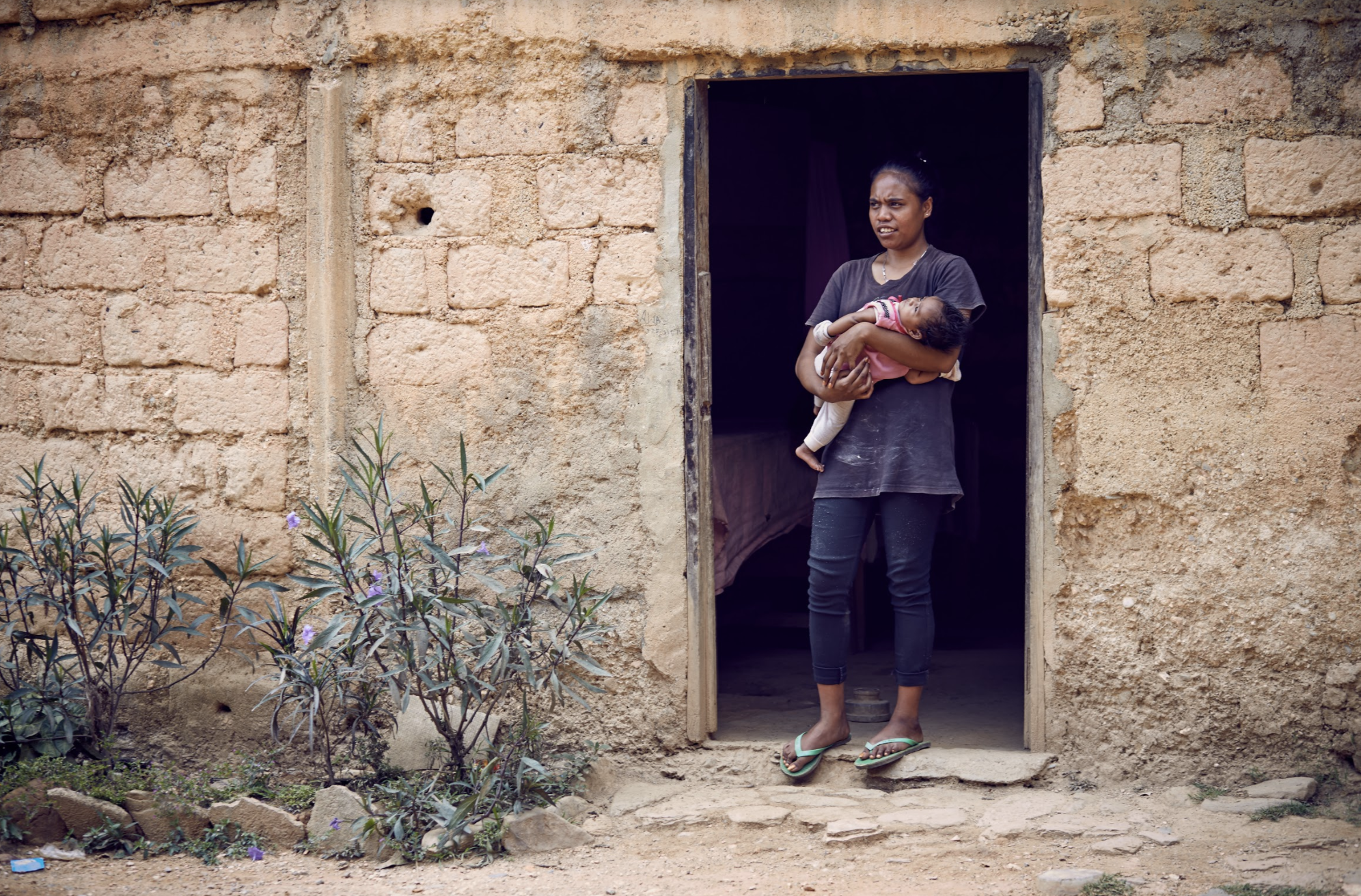As rain patters away on a flimsy tin roof, baby Afeena lies sleeping. On the walls, pieces of cardboard are tacked up, to give warmth, while across a window, a piece of fabric, mint green and paper-thin, blows gently.
In the district of Alieu, set amid the country’s rocky highlands, this family home is typical. Described locally as ‘Uma bai bain’, meaning ‘a simple house’, walls are made of bricks fashioned from crushed rock and concrete, while the floor consists of ruddy soil, moistened and packed tight.
“I knew a little bit about how a baby is made, but not too much,’ Natalia, 19, Afeena’s mother, confides. “I had no education about this at school. No lessons at all related to this topic. Nothing”.
Situated on the very rim of Asia’s south-east, the country of Timor-Leste is one of the region’s poorest and least developed. Having gained democratic independence just 15 years ago, after centuries of occupation, the largely Roman Catholic nation is still very much in recovery and a state of painstaking renewal.
Despite the political gains, however, life for many - and especially that of women and girls - is both disadvantaged and precarious. Raised for the most part to be obedient and have little to no voice in terms of their own future and rights, Timorese girls are quite often subjugated in general by society at all levels and not least in terms of their sexual and reproductive health.
“Our culture is very patriarchal and very traditional, so women and girls do not have power to make decisions for their own selves. For their health, for their body, their participation, their voice, their education. As well, even though some sexuality education curriculum is there in schools, often the teacher is not confident to deliver the information, and it is not something they feel comfortable to talk about. They feel they cannot introduce these ideas to children, it is only for those who are married. They tell me, when they get to this topic, they rip the pages of the textbook out” says Lala Soares, Women and Girls Empowerment Program Manager for Plan International in Timor-Leste.

Image © UNFPA / Ruth Carr
“I dropped out of school and never went to see a doctor or had any consultation’ reveals Natalia, who was also abandoned by her boyfriend soon after her positive pregnancy test result. “I even managed to hide it from my family. When I went into labour I told my father I had back pain, but he soon discovered I was having a baby.”
Traumatised and scared, with no understanding of what to expect, Natalia was rushed to a local clinic. Having lost her mother, who had died during the birth of a younger sibling, Natalia was later relieved to able to deliver Afeena safely. Given her present circumstances, however, Natalia will most likely be compelled to raise her daughter alone.
Alarmingly, almost one quarter of all teenage girls in Timor-Leste will fall pregnant and have a baby by the time they are 20 years old. In addition, some 19 per cent are married by the time they are 18. Even though premarital sex is ‘forbidden’ according to cultural and religious values, most teen pregnancies occur before marriage.
Lucia’s* story exemplifies the very specific and rigid cultural traditions surrounding young people and inter-personal relationships in Timor-Leste, the issue of early pregnancy and the hastily arranged marriages that so often follow as a way to ‘fix the mistake’ already made.
Attending one of Plan’s empowerment workshops in suburban Alieu, Lucia is reticent, clasping her hands tightly as Soares leads the group through assorted activities.
“She is very shy and will not speak up. But I know she is listening closely to everything’, says Soares, “so I keep trying.”
Entering into a romance with a much older teacher while in secondary school, Lucia, now 18, was at first subjected to severe abuse by her family. “When my parents found out I had a boyfriend they were very angry. They told me they wanted to beat me to death. I was very scared and ended up in hospital,” Lucia says quietly, recounting the violence she suffered at home as a result of her relationship.
She resumed the relationship, however, and soon after became pregnant. “I didn’t know you could get pregnant from having sex,” she recalls. From here, a dowry and marriage were firmly set in place.
“My boyfriend’s family came to meet my parents and they arranged for us to get married. They discussed the dowry, and my family gave them ten corn seeds, which symbolises his family having to return with ten buffaloes, together with money. But his family said ‘No, we cannot afford that.’ So they negotiated down to two”.
As well as constraining young women into a situation which may not be of their choosing, data shows that early marriage can also be a precursor to greater control, violence and exploitation by men across their lifetimes.
“The statistics show that the prevalence of domestic violence is even higher amongst girls who get married early, and we currently have an intimate partner violence rate of around 60 per cent in Timor-Leste, so the numbers are very high. In addition, married women, no matter their age, have very little control over their own body and their own fertility. (Contraception can often only be accessed with a husband's consent) so very quickly young women end up with multiple children, limited opportunities and even less choice” elaborates Candie Cassabalian, Youth Specialist for UNFPA, the United Nations Population Fund, in Timor-Leste.

Image: © UNFPA / Ruth Carr
As a way of investigating the issue and providing qualitative research, UNFPA Timor-Leste, in collaboration with Plan International and the government’s Secretariat of State for Youth and Sports has this year commissioned a report entitled “Teenage Pregnancy and Early Marriage”, a striking document that hopes to influence gender advocates and policy makers on a way forward.
Critically, as well as exploring the narratives and contexts of stories like Natalia and Lucia’s, the report also details the contentious issue of adolescent pregnancy and education.
“As well as not having access to sex education, and often having limited agency in terms of her relationship with the opposite sex, when a girl does fall pregnant in Timor-Leste, she is blamed and expected to leave school. The perception is that school is only a place for children and children don’t have sex – or even romantic involvement. So even if the girl is married off quickly, she would not normally be allowed to re-enter school because she has ‘known a man’,” explains Cassabalian.
For Lucia, her recent return to vocational school is considered rare and a situation to which she - and her classmates - are still adjusting, while for Natalia the stigma and shame surrounding her early pregnancy means she does not envisage continuing her studies, leaving her, and her baby, desperately disadvantaged.
In seeking to address these formidable and age-old challenges, the government of Timor-Leste has recently approved the Inclusive Education Policy, a groundbreaking move which outlines several key plans to sensitize the educational community, promote the rights of pregnant teenagers, and make aware to the girls, and their families, the advantages of continuing education.
With just 20 per cent of all women in Timor-Leste participating in the workforce, the situation can only be described as critical.
“If we don’t pay attention, the numbers of teenage pregnancy and early marriage will only increase. As a country, we need to pay attention to the issue of equity and we need gender equality if we want to have a good future”, Soares implores.
* Name has been changed to protect privacy
This story was written to complement the launch of UNFPA’s annual flagship report, State of World Population, whose 2017 theme is “Worlds Apart: Reproductive health and rights in an age of inequality.” Access the report here: http://www.unfpa.org/SWOP


